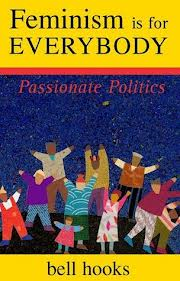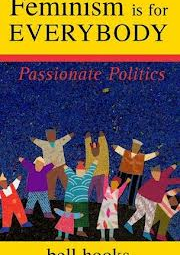
bell hooks is a black feminist, theorist, teacher and writer. In writing Feminism is for Everybody: Passionate Politics, she achieves her earliest objective, which was to create a primer for feminism—for the masses, men and women not associated with feminism or educated in its ideology. The truth is, most people know nothing about feminism other than the stereotypical tidbits offered to them from third hand sources—like television, comics, and other forms of media consumption. Most people associate feminism with man haters, angry women, lesbians, lazy women who think it’s men’s turn to do the dishes and change the diapers. But feminism is so much more than that; it’s about liberation, choices, and having a voice when once we had none of these. bell hooks knew those days—when women were defined by men’s voices and beliefs as to their capabilities; when women could not wear pants; when their bodies did not belong to them; when they had no voice or vote or power; and when clothing, much like the patriarchal conditioning of their time, restrained their bodies and their movements.
When reading this book, it is evident that hooks narrates it from a place of passion for the lay-feminist. Her passion comes from being there when women were first given their rights—to shed clothing that confined them and ideals that oppressed them; to toss out makeup and heels—both tools of beauty that conspired to socialize women in believing that their looks were the most important value they had—the only things they could bank on. Today, hooks and all the other feminists of her time are older—and feminism is a thing—a fossilized idea. Like many of my female students, no one wants to claim she is a feminist. It is an ugly word—a word that has been tabooed and stigmatized. People are now womanists, or humanists, or pro-woman. Feminism is the cuss word that no one can utter in public—conversations will cease, snorts will sound aloud, and heads will shake with disdain in unison. No one but the first feminists remember the objectives, the struggles, the taste of success when women could dress as they wanted; when women were allowed to voice their opinions and knowledge in magazines and newspapers—all of which were dominated by men; when women went to work—by choice—instead of staying home and having dinner ready by 5; or when women began to articulate their voices in politics—and for once, their voices and votes counted for something.
Today, it is because of those women—women like bell hooks—that we find more and more women in politics. And not just aiming for secondary positions, but for the Presidency. We see it globally—women proving that they can lead countries, not just a slew of children at home, in school, or on field trips.
This is what feminism has done—what it has accomplished—and it still has a long way to go because we still exist in patriarchy—in a land wherein not only men dominate but also preconceived and socially conditioned beliefs that women are not made like men, and therefore, are not equal to men, nor will ever be. We think differently; we’re emotional; we’re driven by our hormones; we can’t refuse laws of nature that claim our physical and intellectual weaknesses; and we love fashion and shoes and matching accessories and People magazine and cooking. All those stereotypes still breathe and cough and choke us into our stagnant places in society. It’s just as hard to outgrow stereotypes as it is to outgrow what family members think of you even after you are in your forties; in their eyes, you’ll always be that irresponsible and lazy teen, and three framed degrees on your office wall won’t change their perspective of who you are and what you are capable of.
hooks poignantly recalls the freedom and choices attained by the women of her time and recalls the decline of feminism—or at least how young women revised the original tenets of feminism into “choices” over their bodies and their sexuality. The short skirts are back; the high heels are back; the suburban housewives are back. But even worse, we see a decline in female authority and power—especially as women are presented in mediums like television, music, movies, advertising, and music videos. Now women “choose” to gain power—money, fame, male approval—by objectifying their own bodies. They dress provocatively in high heels, bra straps showing, butt cheeks gasping for air against the tight constraints of thin fabric. Women are obsessed with beauty and physical appearances and diets. They pay money—or they have their boyfriends or husbands—pay for breast implants—and they feel good that they are pretty, youthful-looking, full-breasted and sexy at forty. They like turning men’s heads and feeling desirable. They want to believe that they look like Beyoncé and Jennifer Lopez in their music videos as well as the bare-skinned and flawless portraits on the covers of high-end magazines. But what these women fail to recognize is that they are subscribing to male-defined perversions of beauty that only apply to women—never to men.
And yet again, we find ourselves subject to revision and definition by a society and its laws that once governed over older versions of our femininity. Those women fought like lionesses; they sacrificed and faced ridicule and aggression just to have a voice—to be seen and valued as human beings, equal and independent, not as flesh to be purchased and dressed and approved like USDA-graded prime rib. In the past, a woman’s power in society rested in her beauty, her family’s money, or in her sexual appeal. Now these are all intertwined—starlets like Katy Perry, Beyoncé, Jennifer Lopez, and so many others use their beauty and sex appeal to make tons of money; thus, they have power, voice, and the freedom to do as they please. But is this power? Not in this feminist’s eyes; they do have power, but it’s the power that patriarchy has allowed them to have—it’s their reward for being beautiful and sexy—and the men that manage them, their labels, their clothing, their music, their videos—they all make money, as well. These women are currency, and what they are doing is aiding and abetting the sexist exploitation of the female flesh—their own and that of future girls entering the music/movie/television industry as young as twelve. They make men around them rich—and this is not power. When you have to use beauty and sex to make money, it’s not power. It’s just a new version of the old rules constructed by the good ol’ boys club.
bell hooks hoped for more when she fought for feminism. She fought for more when she taught and wrote about feminism. She hoped for more when she defined feminism as “a movement to end sexism, sexist exploitation, and oppression.” And when I see young women in the Ukraine protest bare-breasted, or hear about a SlutWalk that begins in Toronto and has become widespread—a march provoked by blaming a raped victim for asking for it—wherein the young college women are dressed like “sluts,” I know that feminism is being redefined—but not in a good way—not in the way women originally meant it to be. Its new face is rebellious and in your face, but it’s still based on acceptable female behavior—based on female sex and flesh gone amok—it’s still desirable to men, and they won’t take us seriously if we protest in this manner. Neither will many “old” feminists who sacrificed so much—they cannot and will not.


